Jamaica, May 2006: Day 2, May 19, 2006, Ocho Rios, Spanish Town, Kingston (Mountain Roads, Potholes, Grandpa and Nine Night)
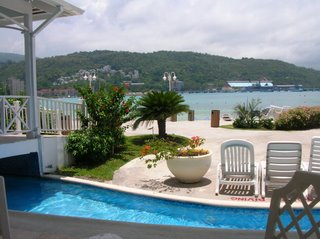
The next day was full of excitement as we prepared for the true test of our driving abilities – the dreaded two-hour or more drive from Ocho Rios to
Kingston.
I declared that we would leave no later than
1 p.m., but after realizing that a beautiful Jamaican morning on a beach with free food and drinks was upon me, I moved our departure closer to
2 p.m. We ate another surprisingly Jamaican meal with ackee, saltfish and cornmeal porridge combined with french toast, eggs and fresh fruit.
The view from our table was fabulous with a view of the beach, harbor and mountains.
I still didn’t like the fact that we were in a gated resort, but with a good view, food, a mimosa and a cup of
Jamaican Blue Mountain coffee, I no longer wanted to complain.
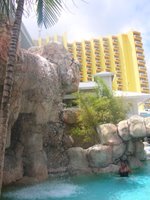

We checked out on-time and after taking care of some business in town we were on the mountainous roads of the A3 heading to Kingston. I always knew my mother disliked my driving, but after a while I started to dislike her as a passenger. Throughout the drive she gripped the handrail and shouted at me as every truck, person, rock, pothole and goat wandered too close to our vehicle. I reminded her about our full coverage on the car, our mobile phone and the fact that I had two options, hit the truck or the pothole. Which one would you choose? We reached Faith’s Penn, a popular roadside collection of shacks selling jerk chicken, roast fish and an assortment of other foods – the Jamaican version of a rest stop. This stop also marked the halfway point of our journey over the mountains. At first, I didn’t want to stop because of timing, but how could I ignore an experience that I had grown to cherish over the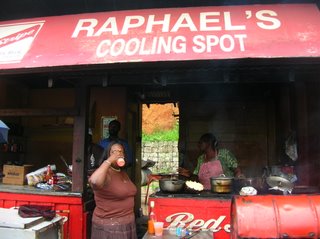 years? My mother haggled her way into only paying $500JA (around $8US) for a ¼ lb. of jerk chicken, four festival (sweet, friend dumplings), a whole fried fish, yam, sweet potato, a Ting (grapefruit soda) and a whole liter of homemade carrot ginger juice – a steal. The guy that got this sale did a good job at attracting us to his spot. When we entered the rest stop, we were mobbed by aggressive proprietors, but this guy came up to us politely and asked what we wanted instead of forcing us to by what he had. He and his family, who were cooking in the shack, were accommodating and warm. I would’ve been scared as a child, but now I was laughing with locals, understanding the language and experiencing a taste of home.
years? My mother haggled her way into only paying $500JA (around $8US) for a ¼ lb. of jerk chicken, four festival (sweet, friend dumplings), a whole fried fish, yam, sweet potato, a Ting (grapefruit soda) and a whole liter of homemade carrot ginger juice – a steal. The guy that got this sale did a good job at attracting us to his spot. When we entered the rest stop, we were mobbed by aggressive proprietors, but this guy came up to us politely and asked what we wanted instead of forcing us to by what he had. He and his family, who were cooking in the shack, were accommodating and warm. I would’ve been scared as a child, but now I was laughing with locals, understanding the language and experiencing a taste of home.
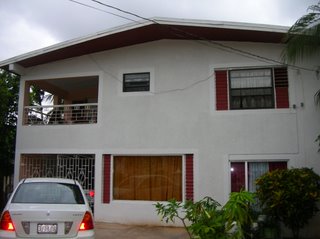 After another hour of mountain roads we arrived at our second pit stop, my maternal grandfather’s house in Spanish Town, a suburb 20 miles west of Kingston. Spanish Town was Jamaica’s administrative capital for more than 300 years until 1872 when Kingston, the merchant center, was named the new capital. The town has seen a sharp decline since then and isn’t for the faint at heart, but it still holds its charm in the people and historic architecture. My grandfather’s house is on the outskirts of the city along the road coming from Ocho Rios. Affectionately called “Grandpa Christy,” my grandfather, Christopher Rose, is a “young” grandfather; he’s only in his early 70s. I spent many summers there as a child being bored by the limited television channels, but entertained playing with local kids, chasing chickens and getting into mischief with my little brother in tow. The house held many great memories of family vacations and playing in the rain with my father. Nothing had changed in the house since my last visit before my father died in 2000. My mother enthusiastically greeted her father as we sat out on his veranda enjoying the evening breeze. At night, Jamaica takes on a beautiful natural symphony as tree frogs, croaking lizards and crickets play a melody that can rock the grumpiest baby to sleep. I was out within 30 minutes. The power had gone out during my nap so I awoke to a candlelight conversation between my mother, grandfather and his wife. I thought it funny that without the conveniences that I take for granted, such as electricity, life can still carry on without a problem here.
After another hour of mountain roads we arrived at our second pit stop, my maternal grandfather’s house in Spanish Town, a suburb 20 miles west of Kingston. Spanish Town was Jamaica’s administrative capital for more than 300 years until 1872 when Kingston, the merchant center, was named the new capital. The town has seen a sharp decline since then and isn’t for the faint at heart, but it still holds its charm in the people and historic architecture. My grandfather’s house is on the outskirts of the city along the road coming from Ocho Rios. Affectionately called “Grandpa Christy,” my grandfather, Christopher Rose, is a “young” grandfather; he’s only in his early 70s. I spent many summers there as a child being bored by the limited television channels, but entertained playing with local kids, chasing chickens and getting into mischief with my little brother in tow. The house held many great memories of family vacations and playing in the rain with my father. Nothing had changed in the house since my last visit before my father died in 2000. My mother enthusiastically greeted her father as we sat out on his veranda enjoying the evening breeze. At night, Jamaica takes on a beautiful natural symphony as tree frogs, croaking lizards and crickets play a melody that can rock the grumpiest baby to sleep. I was out within 30 minutes. The power had gone out during my nap so I awoke to a candlelight conversation between my mother, grandfather and his wife. I thought it funny that without the conveniences that I take for granted, such as electricity, life can still carry on without a problem here.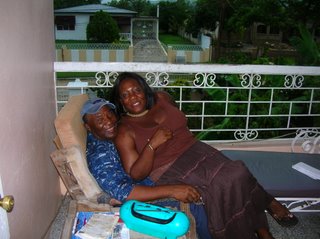
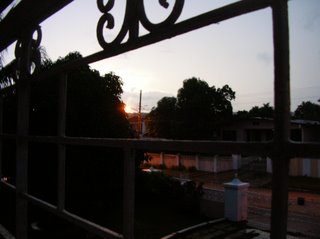
After the lights came back on my mother and I decided to bid farewell to my grandfather in order to get to our hotel in Kingston before it got too late. Back on the road we faced a new obstacle, driving at night in city traffic on the opposite side of the road. There wasn’t much of a difference from our previous experiences, but we had to rely on headlights in order to see the lines in the road because of the lack of street lights on the outskirts of Kingston. Once we reached Kingston things were dramatically different. The decision to move the island’s capital to Kingston was for good reason. Out of a population of 2.7 million, more than a 25% or over 800,000 people live in Kingston. It’s a city full of light, music and mayhem. Drivers sped down Nelson Mandela Highway on their way to the city. Lights twinkled for 180 degrees, from the mountains with their palatial homes, to bustling downtown Kingston and gleaming New Kingston – the country’s financial center. I remembered traveling these roads with my father while he gathered supplies to run the now defunct family grocery store in downtown Kingston. The roads still looked familiar, but there were definite signs of progress. They were now wider. There were more traffic lights. There were automated changing billboards lining the roads. Progress had taken this once boring capital of my uncultured childhood and turned it into thriving metropolis just waiting for me to explore.
A few turns up familiar roads, we entered into another set of gates that contained our hotel, the Terra Nova (17 Waterloo Road, Kingston 10). The Terra Nova considers itself the pride of New Kingston and it has every right to say so. We drove up to what was once an old mansion that was now converted into a luxury hotel catering to New Kingston’s business elite. Again, my mother haggled her way into a deeply discounted rate for a double room for only $150/night including a full breakfast every morning. I barely had time to explore the hotel before we were back out the door heading to the “Nine Night” festivities for Aunt Myrtle. A Jamaican tradition, Nine Night is a party or gathering of the deceased’s family and friends nine days after the death or the night before the funeral in order to provide comfort to one another and to wish the departed Godspeed to heaven. It’s a tradition to prevent the rise of a “duppy” or ghost that might harm the living relatives and friends. It usually consists of heavy drinking, eating and laughing. It was my type of party.
The crowd was significantly older, but the younger “cousins” had all gathered together to discuss the night’s outing to the nightclubs in Kingston and around the city. I conversed with them for a while, but found myself observing other conversations. Death has a funny way of bringing out truth in a family. My mother’s side was no exception as tears, heated arguments and familial revelations flowed throughout the evening. I was amazed that I didn’t see any of this during my father’s funeral, but during that time I was too distraught to even know what day it was.
A few hours later, the crowd had started to wind down. I decided to skip any evening plans with the cousins in order to get some sleep to prepare for the 9 a.m. funeral the next day. My mother and I must’ve said our goodbyes for 30 minutes before we finally filed into our car and heading back to the Terra Nova to sleep.
 The next day was full of excitement as we prepared for the true test of our driving abilities – the dreaded two-hour or more drive from Ocho Rios to
The next day was full of excitement as we prepared for the true test of our driving abilities – the dreaded two-hour or more drive from Ocho Rios to 

 years? My mother haggled her way into only paying $500JA (around $8US) for a ¼ lb. of jerk chicken, four festival (sweet, friend dumplings), a whole fried fish, yam, sweet potato, a Ting (grapefruit soda) and a whole liter of homemade carrot ginger juice – a steal. The guy that got this sale did a good job at attracting us to his spot. When we entered the rest stop, we were mobbed by aggressive proprietors, but this guy came up to us politely and asked what we wanted instead of forcing us to by what he had. He and his family, who were cooking in the shack, were accommodating and warm. I would’ve been scared as a child, but now I was laughing with locals, understanding the language and experiencing a taste of home.
years? My mother haggled her way into only paying $500JA (around $8US) for a ¼ lb. of jerk chicken, four festival (sweet, friend dumplings), a whole fried fish, yam, sweet potato, a Ting (grapefruit soda) and a whole liter of homemade carrot ginger juice – a steal. The guy that got this sale did a good job at attracting us to his spot. When we entered the rest stop, we were mobbed by aggressive proprietors, but this guy came up to us politely and asked what we wanted instead of forcing us to by what he had. He and his family, who were cooking in the shack, were accommodating and warm. I would’ve been scared as a child, but now I was laughing with locals, understanding the language and experiencing a taste of home.  After another hour of mountain roads we arrived at our second pit stop, my maternal grandfather’s house in
After another hour of mountain roads we arrived at our second pit stop, my maternal grandfather’s house in 



0 Comments:
Post a Comment
<< Home